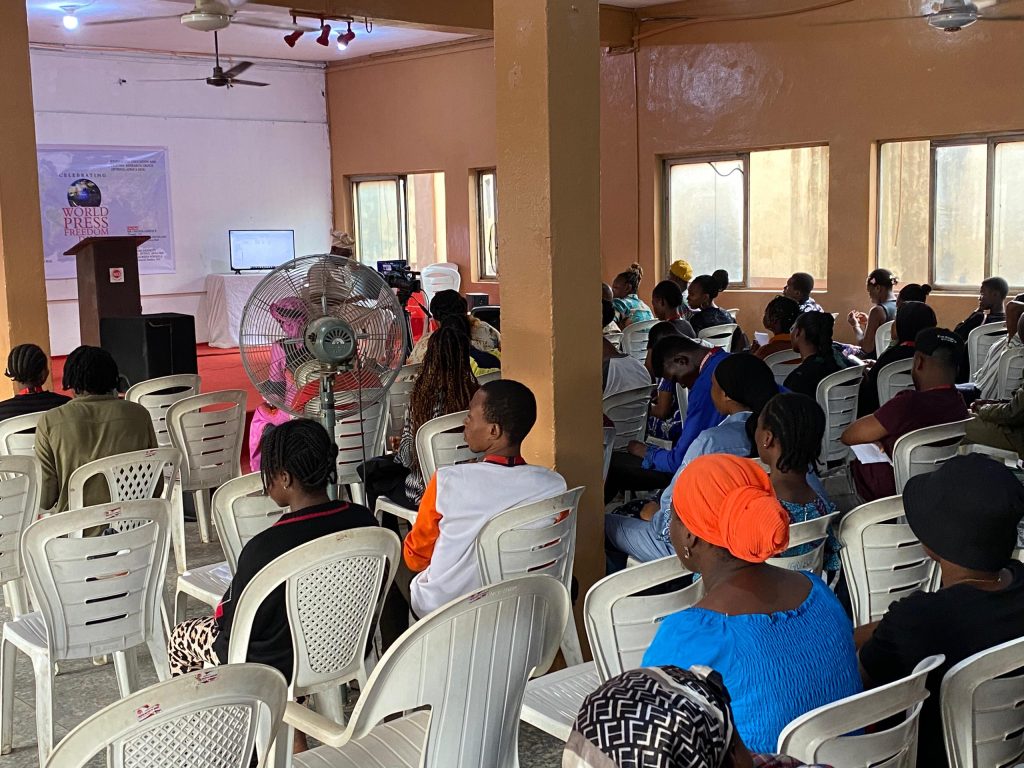The Journalism Education and Trauma Research Group (JETREG) Africa Hub, in synergy with the Nigerian Institute of Journalism (NIJ), organised a programme to commemorate the 2024 World Press Freedom Day.
The event, which took place at NIJ auditorium, Ogba, Lagos, on Friday, May 3rd, focused on discussion around the advocacy for press freedom in Nigeria and to acknowledge the challenges that journalists face while discharging their duties, especially during environmental reporting.
It featured panellist discussions on the theme “Reporting the Environment” alongside the global theme of the year “A Press for the Planet: Journalism in the Face of the Environmental Crisis.”
Key speakers were the Lead at JETREG Africa Hub, Prof. Dele Odunlami; Lecturer at University of Lincoln, United Kingdom, Prof. Ola Ogunyemi; Lecturer at Ghent University, Belgium, Dr Nureni Bakanne; and Environment correspondent, Dr Esther Omofariola.
NIJ Provost, Mr Gbenga Adefaye, in his welcome address, stressed that the programme isn’t just to celebrate media professionals and press freedom but to acknowledge the threats that journalists face in all parts of the world, especially in Nigeria.
“We at NIJ stand in solidarity with media practitioners and professionals who face threats, and we keep on fighting to protect our freedom to inform and to hold those in power accountable.
“We’re here to honour the unwavering dedication of journalists and media practitioners and their effort to hold those in power accountable, expose injustice and give voice to the voiceless. But this is also a remarkable day to acknowledge the challenges such as misinformation, censorship and threats that are affecting the fabric of the profession,” he said.
According to Prof. Ogunyemi who joined the programme virtually, the need to sanitise the information landscape has never been more timely.
He pointed out that many journalists, especially those who work in the field, might experience trauma that nobody talks about. Professor Ogunyemi said this could affect their emotions and minds, and they might only realise it when they retire, which isn’t good for their mental health.
“You’re first human beings before being a journalist. Don’t compromise on your duties as information carriers, but also prioritise your mental care,” he advised the students.
In her presentation, Dr. Omofariola said journalism comes into matters of the environment, not just to expose the threatening issues but also to provide solutions to mitigate them.
The environmental news anchor said, “The effects of climate change transcend borders and ideologies and demand joint efforts. A lot of things are changing around us, including the weather, the seasons, and many more natural factors.
“It is our job as journalists to spread awareness on the impact of climate change. And even you, the young ones who are more tech-savvy, can take advantage of social media to push quality news information.”
While stressing the need for specialisation, Dr. Bakanne noted that students interested in the environment beat could build speciality in areas of Diversity, Water resources, Pollution of various kinds, Natural disasters, Environment policies, Renewed energies and Research.
He lamented that the current curriculum of journalism education in Nigeria is not focusing on these areas to expose students. According to him, newsrooms should provide trauma mentors, peer-to-peer training on capacity building, and insurance for journalists and their families, considering their exposure to hazards.
The programme was convened by Deputy Director of Digital Media, Voice Of Nigeria, Dr. Qasim Akinreti and Head of General Studies in NIJ, Mrs. Maureen Popoola.
While thanking the keynote speakers, Mrs. Popoola reminded the students that they all have a part to play in the preservation of the environment through their actions and inactions as journalists.

